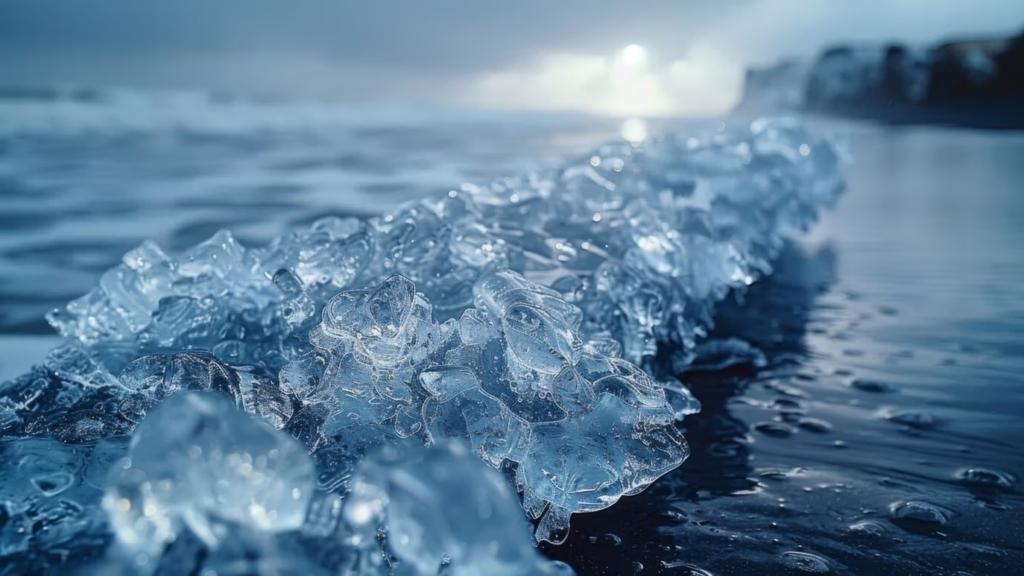
Scientists Find New Form of Water that May Exist on Alien Worlds
Water is the most abundant substance on our planet, and yet, it still holds many secrets. Scientists have long known about the three main forms of water: liquid (H2O), solid (ice), and gas (water vapor). However, researchers at France’s Institut Laue-Langevin have recently made a groundbreaking discovery that changes our understanding of water entirely. They have identified a new form of water, known as plastic ice VII, which exhibits properties of both liquids and solids.
In a study published in the prestigious scientific journal Nature, the team of scientists revealed that plastic ice VII is created under extreme conditions of high pressure and heat. This new form of water may exist deep within the icy bodies of distant planets, such as Neptune and Europa.
So, what makes plastic ice VII so special? To understand its properties, let’s first dive into the basics of water. Water is a unique substance that can exist in three main states: liquid, solid, and gas. In its liquid state, water molecules are free to move and flow easily. In its solid state, water molecules are arranged in a rigid crystal structure, forming ice. In its gas state, water molecules are dispersed and move randomly.
However, under extreme conditions, water can exhibit unusual behavior. For example, at high pressures and low temperatures, water can form a solid that is denser than liquid water. This is known as ice VII, which is the second form of solid water discovered so far.
The new form of water, plastic ice VII, is a unique substance that combines the properties of both liquids and solids. In its plastic state, the molecules of water are arranged in a disordered structure, similar to a liquid. However, unlike a liquid, plastic ice VII has a fixed volume and shape, similar to a solid.
The discovery of plastic ice VII was made possible by the use of advanced scientific techniques, such as neutron scattering and X-ray diffraction. These methods allowed the researchers to study the structure and behavior of water under extreme conditions.
In their study, the scientists used a powerful neutron source to create a sample of water at a pressure of 10 gigapascals (GPa) and a temperature of 200 kelvin (K). This is equivalent to a pressure of about 100,000 times that of the Earth’s atmosphere and a temperature that is just above the freezing point of water.
By analyzing the neutron scattering data, the researchers were able to determine the structure of the water sample. They found that the molecules of water were arranged in a disordered structure, with a fixed volume and shape. This was a significant departure from the expected behavior of water under these conditions.
The discovery of plastic ice VII has important implications for our understanding of the behavior of water in extreme conditions. It suggests that water can exist in a range of states that are not limited to the traditional liquid, solid, and gas phases.
This breakthrough also offers new insights into planetary evolution and the behavior of water in extreme conditions. It is possible that plastic ice VII may exist deep within the icy bodies of distant planets, such as Neptune and Europa.
Neptune, a gas giant planet in our solar system, has a thick icy atmosphere and a system of moons that are thought to be composed primarily of water ice. Europa, a moon of Jupiter, has a thick icy crust that is believed to cover a global ocean of liquid water.
The discovery of plastic ice VII may help scientists to better understand the behavior of water in these extreme environments. It could also provide new insights into the potential for life on these distant planets.
In conclusion, the discovery of plastic ice VII is a significant breakthrough in the field of water science. It offers new insights into the behavior of water in extreme conditions and has important implications for our understanding of planetary evolution and the potential for life on distant planets.
As we continue to explore the universe and search for answers about the nature of life, the discovery of plastic ice VII serves as a reminder of the many mysteries that still remain to be uncovered. With its unique properties and potential to exist on alien worlds, this new form of water is sure to captivate the imagination of scientists and science enthusiasts alike.






